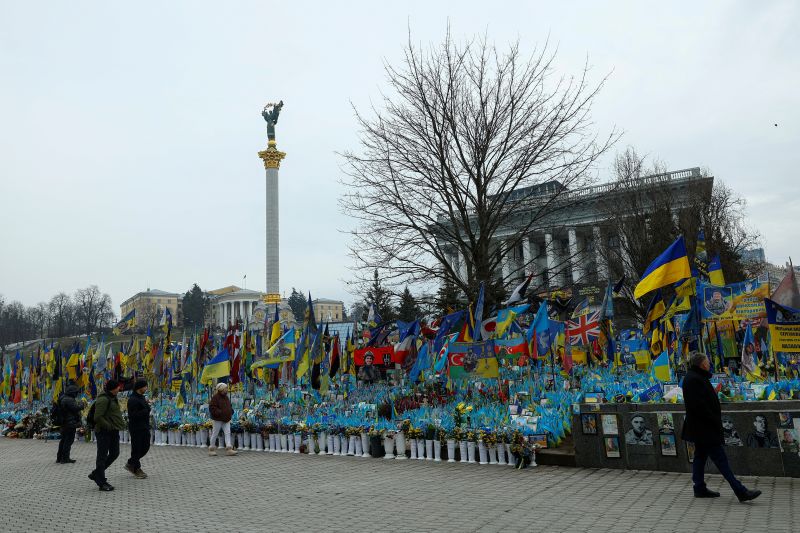The future of Ukraine will be discussed this week in Riyadh between Americans and Russians, with neither Europeans, nor, at the time of writing, Ukrainians themselves at the table. The question for European leaders now is: what can any of them do about it?
A hastily organized meeting in Paris, for now short on details in terms of attendance, is a measure of their concern as they wake up to the reality of Trump 2.0: that their long-standing American ally is no longer much of an ally and may in fact be far more dangerous to them existentially than they had imagined possible only a week ago.
There was, of course, US Vice President JD Vance’s startling speech in Munich on Friday, a rallying cry to the European far right that was quickly seized upon by their news outlets, in which he accused a stone-faced crowd of democratically elected European leaders on their own continent of selling out.
In a remarkable and disingenuous twisting of recent European history, Vance accused his audience of having betrayed the very ideals that allies had fought for during World War II. The danger, he said, warming to a theme he had touched upon in Paris just a few days before at French President Emmanuel Macron’s AI summit, was in Europe’s stifling of free speech, warning his audience that they should fear neither Moscow nor Beijing but European leadership itself.
It was a speech that went so much further than anyone had anticipated by questioning the moral underpinnings of the NATO alliance itself, rather than simply the operational question of budgetary contributions that had so far been President Donald Trump’s principal gripe.
Yet the vice president’s words, as surprising as they were, were not the only ones to set European alarm bells ringing.
Another senior American official to speak in Munich was the special envoy for Ukraine, Keith Kellogg, who sought to reassure the conference with tough words about his plan for extracting concessions from Russian President Vladimir Putin.
The American position, he said, was to be tough on Moscow, to demand territory from Russia and security guarantees for Europe. Yet his comments came only days after US Defense Secretary Pete Hegseth told his NATO counterparts in Brussels that he couldn’t see Ukraine joining the alliance at all, sweeping aside in one fell swoop not just the American position thus far but also what many had considered a key piece of leverage as negotiations with Moscow began.
The fear for Europeans is not now simply that Americans are preparing to negotiate without them but that they are preparing to negotiate badly without them. And while an invitation to Ukrainian leaders to join the discussions in Saudi Arabia may be in the post, for now the prospect is of American and Russian negotiators gathering around a table to discuss not just the future of the 6 million Ukrainians currently living under Russian occupation but also that of a European security architecture that impacts most closely the people living in Kyiv and Paris and every city in between.
The fact is that European countries, like their American ally thus far, spent nearly three years depleting their own arsenals and treasuries in the name of a fight for freedom and democracy that had felt to them existential as the Russian invasion began. That now appears to have been entirely brushed aside in the name of political expediency and the search for peace.
And, while peace is also what Europeans aspire to, their worry is now how costly it may be, given the price Washington seems prepared to pay, and how short lived, given Putin’s record.
Hence the meeting in Paris. European leaders may not be able to weigh in on the terms of a future peace deal but they do hope to find ways of giving security guarantees to Kyiv. Yet the danger facing them as they head to the French capital is that that just as the fight for Ukraine united them three years ago, so too might the specter of peace on their Eastern flank divide them once more. Particularly at a time when several of them are facing an increasingly emboldened and electorally successful European far right that is far more closely aligned with Washington’s new leaders than they are.
But European leaders are also keen not to appear rattled. The French foreign minister explained on French radio on Sunday that these sorts of meetings happened all the time. And Macron himself billed Monday’s talks as “an informal meeting” for those interested “in peace and security in Europe.”
For now, we expect not only the presidents of the EU council and Commission to attend, but also the NATO secretary general and the leaders of Germany, Spain, Italy, Poland and Denmark. The British prime minister has also confirmed his presence, with Downing Street calling it a “once in a generation moment” for national security.
Few of those heading to Paris had doubted that Trump meant what he said the first time round, it’s more that now he appears to have surrounded himself with people who know exactly what they’re doing when it comes to undermining Europe and dismantling NATO. And they are, it seems, done with doing Europe’s bidding. This will make Monday’s meeting not just about how to help Ukraine, but, at its heart, about how to save Europe itself.

